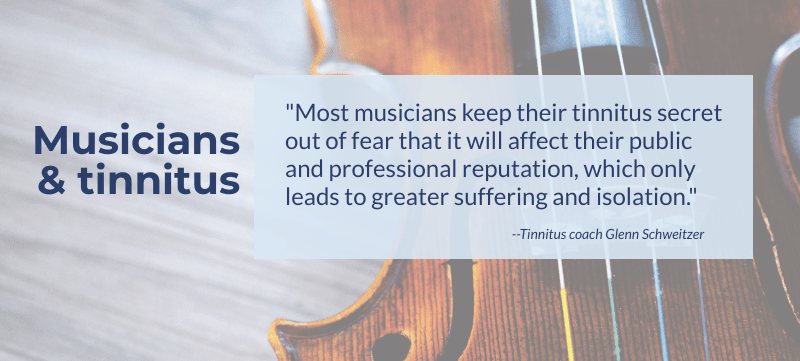Yes, it is possible to be a musician with tinnitus. Tinnitus is a ringing or buzzing in the ears that can result in hearing loss, but with proper management and protection, musicians can continue to play and create music.
Tinnitus can be caused by exposure to loud noises and music is certainly a potential contributor. Musicians are at risk for developing tinnitus and other hearing-related issues due to prolonged exposure to amplified sounds and concerts. However, with the right precautions, such as wearing hearing protection and monitoring volume levels, musicians can protect their ears and prevent further damage to their hearing.
Additionally, there are treatment options available for those suffering from tinnitus, such as sound therapy and cognitive behavioral therapy. With proper management and protection, becoming a musician with tinnitus is possible and can lead to a fulfilling career in the music industry.

Credit: www.healthyhearing.com
Understanding Tinnitus
Tinnitus is a condition that affects millions of people worldwide, where a person experiences a ringing or buzzing sound in their ears that doesn’t come from an external source. The sound can range from mild to severe and can be intermittent or constant, affecting a person’s quality of life. For musicians, tinnitus can have a significant impact on their career and overall ability to perform. In this section, we will discuss what tinnitus is, its causes, and its impact on musicians’ careers.
What Is Tinnitus?
Tinnitus is a condition where a person hears a sound in their ears that no one else can hear. This sound can be described as ringing, buzzing, hissing, or clicking, and it can be loud or soft, high-pitched or low-pitched. Tinnitus can be caused by a variety of factors, including exposure to loud noise, age-related hearing loss, ear infections, or side effects from medication. It is a common condition, affecting approximately 15-20% of people worldwide.
Causes Of Tinnitus
Tinnitus can be caused by a variety of factors, and it can vary from person to person. One of the most common causes of tinnitus is exposure to loud noise, such as playing music at high volumes without proper ear protection. Other causes can include ear infections, certain medications, and underlying health conditions. Age-related hearing loss is also a common cause of tinnitus, as the hair cells in the inner ear that detect sound can become damaged over time, leading to hearing loss and tinnitus.
Impact Of Tinnitus On Musicians’ Careers
For musicians, tinnitus can have a significant impact on their career. Persistent and loud tinnitus can make it difficult to focus on playing music, leading to mistakes and decreased performance quality. It can also cause discomfort and pain, making it challenging to practice or perform for extended periods. Moreover, musicians are exposed to loud sounds during their performances and rehearsals, which can cause or exacerbate tinnitus. If left untreated, tinnitus can affect a musician’s ability to play music and even lead to depression or anxiety.
In summary, tinnitus is a hearing condition that causes a ringing or buzzing sound in the ears. It can be caused by exposure to loud noise, age-related hearing loss, and other health conditions. For musicians, tinnitus can have a significant impact on their ability to play music and their overall career. It is crucial to take steps to prevent and manage tinnitus, such as using proper ear protection and seeking medical advice if you experience symptoms.
Challenges Musicians With Tinnitus Face
For music enthusiasts with tinnitus, pursuing their passion can be challenging. Musicians with tinnitus often face difficulty hearing, which can impact the quality of their performances. Despite these challenges, with proper hearing protection and management techniques, it is possible for musicians to continue pursuing their passion.
Musicians rely heavily on their hearing to perform their craft. However, those who suffer from tinnitus face multiple challenges that affect their ability to create music. Tinnitus, a condition characterized by a persistent ringing or hissing sound in the ears, affects millions of people worldwide. It affects musicians in a unique way, often making it challenging to differentiate notes, hear specific sounds, and discern different sounds.
Hearing Loss
Tinnitus can lead to hearing loss, which can adversely affect a musician’s career. Musicians with hearing loss often have difficulty hearing high-pitched notes and vocal harmonies. In addition, noise-induced hearing loss can cause musicians to struggle to hear themselves, making it challenging to stay on key or hit the right notes. Musicians must protect their hearing to prevent further damage, and ear protection is a must during rehearsals, live performances, and recording sessions.
Difficulty In Hearing Specific Sounds
Musicians with tinnitus may face challenges hearing specific sounds or frequencies. For example, a guitarist or bassist with tinnitus may struggle to hear low-frequency notes, making it challenging to stay in rhythm with other band members. Similarly, a singer with tinnitus may struggle to hear their vocals compared to the instruments playing in the background. This can affect their tone, pitch, and overall performance.
Difficulty In Differentiating Different Sounds
Musicians with tinnitus may face challenges differentiating different sounds, especially when multiple musical elements are playing at the same time. For example, a drummer with tinnitus may find it difficult to differentiate between the cymbals and the snare, while a pianist may struggle to differentiate between different keys of the piano. This can impact the overall quality of the performance and affect the musician’s confidence. In conclusion, tinnitus can be a significant hurdle for musicians, affecting their hearing, timing, and overall performance quality. Musicians living with tinnitus must take steps to protect their hearing and equip themselves with adequate ear protection. Although tinnitus poses significant challenges, it’s possible to be a musician and manage the condition effectively with the right support, treatment, and healthy hearing habits.
Famous Musicians With Tinnitus
Many famous musicians suffer from tinnitus, which is a common problem among those who are frequently exposed to loud music. Despite this, they have continued to pursue their passion for music. While it can be challenging, it is possible to be a musician with tinnitus with proper care and preventative measures.
Overview Of Musicians With Tinnitus
Tinnitus, a problem of the ear where the person hears a constant ringing or buzzing, can be a real impediment for musicians. It can have an adverse effect on their ability to perform, suffer emotionally, and lead to a decline in their overall quality of life. But, there are many successful musicians who have been diagnosed with tinnitus, and they have found ways to manage it and continue with their musical careers.
How These Musicians Have Coped
Many musicians who are dealing with tinnitus have had to take a break from music to deal with their condition. A good example of this is Chris Martin, the lead singer of Coldplay. Chris took a break from music for four years to adjust his health and cope with his tinnitus. Other musicians have been able to manage their condition and continue performing, such as Neil Young, who uses Custom Earplugs that help him control the noise during his performances. There are also other methods that musicians can try to help mitigate the effects of tinnitus. The use of devices such as in-ear monitors and noise-cancelling headphones can help reduce exposure to high volume sound. These devices allow musicians to hear the music without exposing their ears to the dangerous sounds that can trigger tinnitus. Some musicians, like Eric Clapton, have also turned to alternative treatments such as acupuncture, hypnosis, and meditation to deal with their tinnitus. It is essential to note that what works for one person may not work for another, as the causes and symptoms of tinnitus can vary from person to person.
Conclusion
Overall, there is hope for musicians who suffer from tinnitus. By taking proper precautions and utilizing coping strategies, they can successfully manage the condition and continue enjoying their musical careers. Famous musicians like Pete Townshend, Ozzy Osbourne, and Barbara Streisand have all experienced tinnitus and were able to continue performing. It is important to note that tinnitus should be taken seriously, and if you are experiencing symptoms, you should seek medical attention right away.

Credit: chicagohearingservices.net
Ways Musicians Can Prevent Tinnitus
Musicians can prevent tinnitus by wearing earplugs during rehearsals and performances, avoiding loud concerts, taking breaks, and using noise-cancelling headphones. Having tinnitus doesn’t necessarily mean the end of a music career, but it’s important to take precautionary measures to prevent worsening of the condition.
As a musician, tinnitus can be a major source of frustration and can even affect your career. Tinnitus is the perception of noise or ringing in the ears, and it’s often caused by exposure to loud sounds. Fortunately, there are ways to prevent tinnitus and protect your hearing while still enjoying your passion for music. Here are some ways musicians can prevent tinnitus:
Using Ear Protection
Wearing earplugs or earmuffs is one of the best ways to prevent tinnitus. You can invest in custom-fit musician earplugs which can provide a good balance between reducing sound levels and maintaining sound quality. Alternatively, use over the counter (OTC) filters, such as foam earplugs, silicone, or wax earplugs. With earplugs, you will still be able to hear the music, but at safer levels. When purchasing earplugs, look for ones with a high noise reduction rating (NRR).
Taking Breaks During Performances
As a musician, you may be tempted to play for hours on end. However, taking breaks during your performances is essential for preventing tinnitus. Give your ears a rest for at least 15 minutes every hour. If you’re a drummer, switch to rods, brushes, or Hot Rods that are less likely to damage your ears.
Staying Away From Loud Music
The obvious way to prevent tinnitus is to avoid exposure to loud noise. If you know you’re going to be in a loud environment, take steps to protect your ears. When looking for gigs or attending concerts, the use of apps like Soundprint will provide average sound levels of certain venues you choose to attend. In conclusion, Tinnitus can be a frustrating experience for anyone, but it can be especially troublesome for musicians. However, by using ear protection, taking breaks during performances, and staying away from loud music, you can prevent tinnitus and protect your hearing. Protecting your hearing is a lifelong investment that is worth it.
Effective Treatments For Tinnitus
Effective treatments for tinnitus can be a great matter of concern for frequent musicians. However, tinnitus doesn’t always hold back musicians from pursuing their passion of music. Noise cancelling earplugs and tinnitus management therapies can effectively treat the condition while allowing musicians to play their instruments.
Living with tinnitus can be a nightmare for many musicians. The constant ringing, buzzing, or hissing in your ears can affect your ability to perform, and the emotional toll can be overwhelming. While there is no cure for tinnitus, there are several treatments that can help manage its symptoms. In this article, we’ll discuss three effective treatments for tinnitus: sound therapytinnitus retraining therapycognitive behavioral therapy.
Sound Therapy
Sound therapy is a common treatment for tinnitus that involves listening to soothing sounds that can help mask the ringing in your ears. White noise machinessound generatorssound pillows are a few popular examples of sound therapy devices that can help alleviate tinnitus symptoms. These devices produce different sounds, such as ocean waves, rain, or soft music, that can help reduce the perception of ringing in your ears.
Tinnitus Retraining Therapy
Tinnitus Retraining Therapy (TRT) is a type of sound therapy that involves counseling and sound therapy. It is a specialized type of therapy designed to retrain your brain to perceive the sounds of tinnitus as less bothersome. In TRT, patients are exposed to low-level sounds that can help desensitize them to the ringing in their ears. Additionally, TRT counselors can provide advice on how to cope with tinnitus and identify situations that might exacerbate symptoms.
Cognitive Behavioral Therapy
Cognitive Behavioral Therapy (CBT) is a type of therapy that focuses on changing negative thoughts and behaviors related to tinnitus. CBT can help musicians manage the stress, anxiety, and depression often associated with tinnitus. It is a goal-oriented therapy that can help patients identify their negative thoughts and behaviors related to tinnitus and replace them with positive ones. CBT is often used in combination with other tinnitus treatments, such as sound therapy and TRT. In conclusion, tinnitus can be a challenging condition to manage, but there are several effective treatments available. Sound therapy, TRT, and CBT can help alleviate symptoms and improve a musician’s quality of life. If you’re struggling with tinnitus, talk to a healthcare provider about which treatment options might be right for you.

Credit: www.earpeace.com
Frequently Asked Questions Of Can You Be A Musician With Tinnitus
How Do Singers Deal With Tinnitus?
Singers can deal with tinnitus by avoiding loud and excessive noise, wearing earplugs or noise-cancelling headphones during performances, taking breaks during rehearsals, and using sound therapy techniques like white noise machines or music therapy. They should also consult an audiologist for customized advice.
Can You Still Listen To Music With Tinnitus?
Yes, you can still listen to music with tinnitus, but you should do so at a safe volume to avoid making your condition worse. It’s important to protect your hearing and avoid any loud music or exposure to loud noises that could make your tinnitus worse.
Consider using noise-cancelling headphones or earplugs to reduce the sounds that may trigger your tinnitus.
Does Tinnitus Affect Music Production?
Yes, tinnitus can affect music production as it can cause difficulty in hearing certain frequencies or pitches and may also lead to problems with concentration or focus. It can also increase sensitivity to sound, making it challenging to work in a noisy environment.
Proper management and treatment of tinnitus are necessary to prevent such issues.
How Many Musicians Suffer From Tinnitus?
Around 60% of musicians have tinnitus, according to a study by Help Musicians UK. Tinnitus is a common problem among musicians due to exposure to loud music and inadequate hearing protection. Prevention is key, and musicians should use earplugs, take regular breaks, and avoid exposure to excessively loud sounds.
Conclusion
Music is a dear passion for many, and the diagnosis of tinnitus should not discourage them from pursuing it. There are many musicians who continue to create beautiful music despite their tinnitus. In fact, it might even make them more aware of the sounds they create.
However, it is essential to take precautions to minimize the impact of tinnitus. Consultation with a physician, taking breaks, and utilizing hearing protection equipment are some helpful steps. With proper care, passion, and commitment, a musician with tinnitus can continue to share the gift of music with the world.